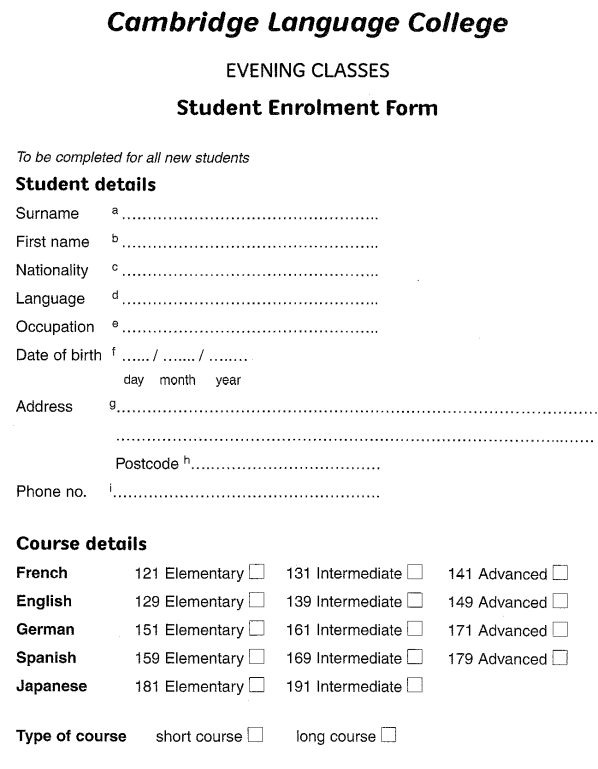Файл: Практикум для курсантов, обучающихся на многоуровневой основе в 2 частях Часть 1 3е издание, переработанное.doc
ВУЗ: Не указан
Категория: Не указан
Дисциплина: Не указана
Добавлен: 27.03.2024
Просмотров: 75
Скачиваний: 0
ВНИМАНИЕ! Если данный файл нарушает Ваши авторские права, то обязательно сообщите нам.
Ex. 4. Choose the right word or phrase in the box and use it in the appropriate tense form.
| to introduce to acquaint to get acquainted to meet |
1. I'm glad you have come. I want ... you to my parents.
2. Michael ... himself to Soames as he was eager ... with Fleur.
3. He ... me with his latest experiments.
4. George was ... to Helen at our party.
5. She refused to talk to him as they were not ... with one another.
6. Will you ... me to your friend? - Oh, aren't you ... yet?
7. He was eager ... with the contents of his aunt's letter.
8. I want you to ... my friend, Helen.
9. We had a lovely time in the rest-home and ... a lot of interesting people there.
10. I'm so sorry I haven't ... you earlier.
Ex. 5. a. Complete questions 1 – 6 with the best missing word. Then match the questions to the answers a – f.
|
|
b. Now complete the questions 7 – 12 and match them to the answers g – l.
7. … old are you? g. I’m Spanish.
8. What … are you? h. Twenty-five.
9. … you got any brothers or sisters? i. I’m still not very good at it.
10. How … do you earn? j. Yes, it’s a dog.
11. How … do you speak English? k. Not enough!
12. Do you have any …? l. Two brothers, elder and younger.
c. Which of the twelve questions above you would ask …
1. the first time you met someone?
2. once you knew them a bit better?
Are there any questions which you would never ask? Why not?
d. In groups of three or four, use some of the twelve questions from the exercise to find out the following:
1. Who is the oldest in the group?
2. Who is the youngest?
3. Who will be the next person to have a birthday?
4. Who has the most brothers and sisters?
5. Who has a pet?
6. Who does the most interesting things when they’re not working?
e. Try to find the person in your group you have most in common with. Start by asking questions 1 – 12 from the exercise. Then make up your own questions to find out what you want.
Ex. 6 a. Fill in the blanks with the correct prepositions from the box.
| in (4) on (2) from after about of (5) at (2) with for (2) |
Let me introduce myself. My name is Alex. My surname is Sokolov. I’m seventeen years old. I was born 1) … the fourteenth 2) … May 3) … 2004. I come 4) … Novosibirsk, the city 5) … the east 6) … Russia. I want to tell you a few words 7) … myself. I started school when I was seven and finished it 8) … the age 9) … seventeen. I have always been interested 10) … aviation, that’s why I decided to enter a University connected 11) … it. I got quite high scores 12) … my USE (Unified State Exam) and now I’m a first year student 13) … Moscow Aviation Institute 14) … a budget basis. I study 15) … the Faculty 16) … Aircraft Engineering. I enjoy the course a lot. I like being a student and I understand that I must work hard to become a good aviation engineer 17) … I graduate. I try my best to study well 18) … making a successful career 19) … the future. So, I do everything possible to achieve my aim.
b. Make up a true story about yourself based on the text above and report it to your group mates / teacher.
Track 1. Ex. 7. Listen to a foreign student in the UK as she phones a language school to enroll on an evening class. Complete the form.
 |
III. DAILY ROUTINE
Ex. 1. a. Match the synonyms.
1. daily routine a. with good results
2. to get dressed b. to walk
3. to go on foot c. to have a nap
4. to miss a lesson d. to wash up
5. successfully e. to put clothes on
6. interval f. daily affairs
7. occasionally g. a quarter of an hour
8. to get some sleep h. not to be present at a lesson
9. to wash the dishes i. from time to time
10. fifteen minutes j. break
b. Read and translate the text.
We all have our own daily routine. My name is Maxim, I am a first-year student of the college. I want to talk about my typical day. So on weekdays my alarm clock wakes me up and my working day begins. Every morning I get up at seven o’clock and make my bed. Then I go to the bathroom where I wash my face, clean my teeth, have a cool shower and brush my hair. Then I do some exercise to feel great all day. I usually watch music clips on TV at breakfast. After that I get dressed. My morning procedures usually take me about fifty minutes. So I leave the house at ten minutes to eight and walk to the nearest bus stop. I live rather far from the college and it usually takes me about a quarter of an hour to get there by bus. Sometimes when the weather is fine and I have enough time I walk to the college.
My lessons begin at 8.30. I usually have three or four double lessons a day. I have different subjects. I don’t often miss my classes because I want to pass my examinations successfully. At twelve o’clock we have a big interval for lunch which we have in the students’ canteen. That’s my favourite time. That is the time to share the latest news with my friends. From time to time I have to stay at the college till late in the evening because I go to the library to get ready for my practical classes or to write a report and I attend consultations which our teachers regularly give. As a rule, I have no free time on weekdays. So, by the end of the week I get very tired.
When I come home, I rest for a while: read something, watch TV or have a nap. After that I do my homework and tidy up the room. If mom asks me, I do some housework: vacuuming, sweeping, washing up, taking the rubbish out or going shopping. In the evening I have dinner with my family. We all get together, joke, have fun, share all the news, discuss our family affairs.
At the weekend I like surfing the internet, playing computer games, I also check emails, chat with friends, or watch a movie. Sometimes I go for a walk in the park or visit my friends.
I go to bed at eleven. I like to read something before going to bed or to listen to some music. Sometimes I fall asleep while I am reading.
c. Identify the following statements as T (true) or F (false) and correct the false ones. Prove your ideas.
1. Maxim leaves the house at ten minutes to eight.
2. Sometimes he has some extra activities at college.
3. Maxim likes lunch time because he has an opportunity to communicate with his friends.
3. As a rule on weekdays Maxim has no free time to help his mom around the house.
4. Maxim goes to bed at eleven and always falls asleep at once.
d. Answer the questions.
1. What time does Maxim get up?
2. What do Maxim’s morning procedures include?
3. What does Maxim usually do at breakfast?
4. How does Maxim get to college and how long does it take him?
5. Why doesn’t Maxim often miss classes?
6. What does Maxim sometimes stay late at college for?
7. How does Maxim rest after he comes home?
8. What kind of housework does Maxim help his mother with?
9. What do Maxim and his family usually do at dinner?
10. What is Maxim busy with at the weekend?
Ex. 2. a. Match the synonyms.
| 1. a morning person 2. desire 3. up bright and early 4. to set off to 5. to have a snack 6. to be to blame 7. to ruin | a. to be guilty b. to spoil c. to have a bite d. to leave to e. an early riser f. urge g. refreshed and full of energy |
b. Read and translate the text.
I’m Steve, I'm in the first year at the university, where I'm studying English. My elder sister, Betty, is studying history at the same university. Betty can organize her time wisely, whereas I do not know what order I should do things in. I find it hard to get up on time, and usually I do not get enough sleep. I have to wind two alarm-clocks to make sure I do not oversleep.
My sister, an early riser, is awake by 7 o'clock, refreshed and full of energy. While I'm wandering round the kitchen, fighting the urge to go back to bed, my sister manages to have a quick shower, make her bed, put on make-up, do her hair, eat a full breakfast and set off to the university. It takes me an hour and a half to get ready. I have a hasty bite and rush out of the house. Even if I catch a bus at once I still arrive at the university 15 minutes late, which always makes me feel guilty.
My studies keep me busy all day long. I have 14 hours of English a week. I also have lectures and seminars. At lunchtime I meet up with my sister and we have a snack at the university cafe. After classes I make myself go to the library where I spend about six hours a week reading for my seminars.
My sister and I come home tired. I always find excuses to put my homework off. Unlike me, my sister manages to do the housework and get down to homework. I like the idea of going to bed early, but quite often I have to sit up late, brushing up on my grammar and vocabulary, though I feel sleepy. My sister says that keeping late hours ruins one's health. Of course, I agree.
As my sister and I do not get any time off during the week, we try to relax on the weekends. One of my greatest pleasures is to lie in bed and read my favourite books. My sister is a sporty person. To keep herself fit, Betty goes for a run in the park; from time to time she works out in the gym.
I hate staying in, and sometimes on Saturday night my sister takes me out to a concert or a play. Sometimes we go to a party or to a disco. But more often than not I end up catching up on my studies and my sister goes out. I wonder how I manage to spoil my leisure time.
Every Monday when I awaken I think I should start a new life. I honestly think that I must become well-organized and correct my daily routine. I make plans to go to keep-fit classes, to do shopping with my sister, to do the cleaning and to do a hundred other good things. But then I remember that I have to call on my school friend in the evening, and I put off my plans till next Monday. It is always better to start a new life in a week.
c. Identify the following statements as T (true) or F (false) and correct the false ones. Prove your ideas.
1. Both Betty and Steve are morning persons.
2. Betty is good at planning her daily routine.
3. Steve has quite a busy schedule at university.
4. Betty and Steve always go out together.
5. Steve has some desires to make his routine more organized.
d. Answer the questions.
1. What faculties do Betty and Steve study?
2. Why can Betty manage to do everything?
3. What do Betty’s morning procedures involve?
4. How does Steve’s morning time differ from Betty’s?
5. What is Steve’s university time devoted to?
6. Do Betty and Steve do the same activities to relax? If no, how do they differ?
7. Why does Steve often have to stay up late?
8. What do Betty and Steve usually do on Saturdays?
9. What is the picture of new life for Steve?
10. What prevents Steve from starting a new life?
Ex. 3. a. Read and translate the text. Rearrange the extracts of the text in a logical order.
How a Daily Routine Changes Your Life
A. Carl has been following this routine for over 10 years — nap time, email time, exercise, dog walking and closing down his day. He thinks the biggest benefit of having a set routine is that you will start doing things you may not want to do. These things will become your habits.
“You no longer over-think things and persuade yourself not to do them. Instead, no matter how you feel, you will just do it.”
For example, Carl has wanted to get fluent at Korean for years but failed miserably each time. So this year, he is determined to achieve that goal. He has joined the “Language club” and modified it to allow him to study for 45 minutes every weekday morning. In just 10 months, his language level has gone from ‘survival Korean’ to conversational Korean.
B. Your daily routine consists of all of your habits. These actions structure your day and make the difference between operating at peak efficiency and struggling to make it through a poorly-planned day. You can have energizing, time-saving routines, or you can adopt draining, inefficient routines. The choice is up to you. An excellent daily routine sets you up for success. If you make just one change that saves you 10 minutes per day, you can regain 60 hours of your precious time back each year.
Recently, I’ve had an interview with a renowned productivity and time management coach, Carl Pullein, about his daily routine.
C. With daily routines, you will be taking baby steps consistently towards your goal over a period of time. Having a daily routine helps you focus on the important things in life.
“My closing down routine at the end of the day – I call my “Golden Ten” – is where I can see the big picture of what I am trying to achieve. This allows me ten minutes each day to review how I am doing on my goals and set objectives for the next day that will help me achieve my goals. It’s a way to make sure I am moving in the right direction and if I am not, I can make any necessary adjustments.”
Having a daily routine not only makes you more efficient, it also eliminates your need to waste time deciding what to do next. It’ll help youbuild good habits and break bad ones. It seems counter-intuitive, but adding some structure to your life can set you free.
D. “I wake up at 5 AM every weekday morning and spend the first 45 minutes studying Korean and then 15 minutes in quiet meditation. At 6 AM I will check my email for 20 minutes. 10:00 AM is nap time, usually 20 to 40 minutes. It depends on how tired I feel but I try to allow a complete hour for resting. 2 PM is exercise time. This has set days. Sunday to Thursday are exercise days and at 2 PM on those days, I will stop what I am doing and do my exercise for the day.
8:30 PM is 40 minutes dog walking. During that time I have no digital devices with me. It’s just me and my dog and nature. This is the best time of the day for reflection and idea generation.
At 10 PM, I will close down my day with a set routine of some basic admin tasks, setting my objectives for the next day and closing out my journal for the day. This usually lasts around 30 minutes. Then it is bed time around 11 PM.”
b. Do you plan your daily routine? Why? / Why not?
c. Take a vote and make three groups. The first group gives the ideas proving the benefits of planning a day. The second group points out the negative sides of a poor-planned day. And the third group gives the reasons for planning a day not being necessary. Use the words and expressions in the text given in bold.
Ex. 5. Fill in the word combinations with the verbs from the boxto make phrases describing a daily routine. Some of the verbs can be used several times.
| get go have iron watch come do listen take read buy | |||
| 1. ….. the laundry | 5. ….. TV | 9. ….. a book | 13. ….. a newspaper |
| 2. ….. up | 6. ….. home | 10. ….. to music | 14. ….. the clothes |
| 3. ….. dinner | 7. ….. breakfast | 11. ….. a shower | 15. ….. dressed |
| 4. ….. to bed | 8. ….. to work | 12. ….. shopping | 16. ….. lunch |
Ex. 6. Choose the correct expressions for each picture.








 Начало формы
Начало формыEx. 7. a. Complete questions 1 – 6 with the words from the box. Then match the questions to the answers a – f.
| time late chores procedures bed lunch |
-
What … do you get up? -
How long do your morning … take you? -
Do you have … at home? -
Are you often … for classes? -
Do you have any household … ? -
Do you go to … late?
-
No, I have it at university. -
I need about forty minutes for these all. -
It’s always at seven on weekdays. -
Not often, only sometimes. -
Yes, washing up and taking the rubbish out. -
It’s often so, as I’m a night person.
b. Work in pairs. Role-play a dialogue using the questions in a.
| | Sandra | John | Sam | Grace | Mia | James |
| gets up | 5.00 | | | | | |
| goes to bed | | | | | | |


